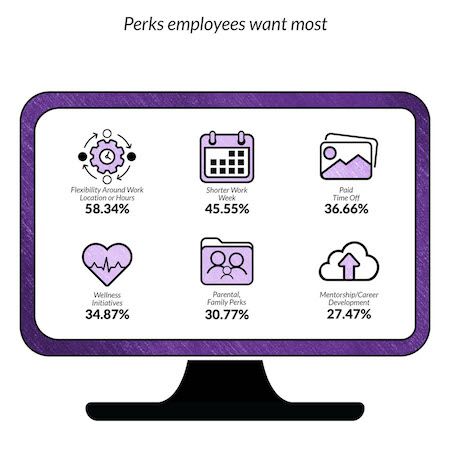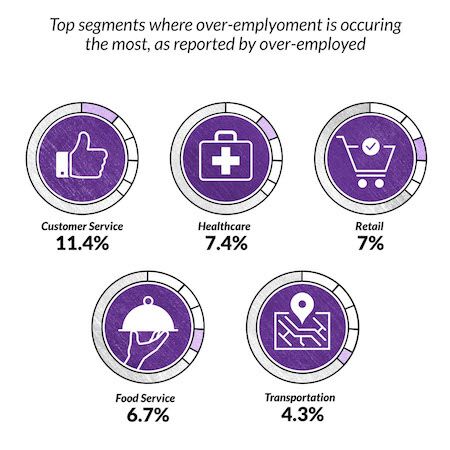Due to so many different circumstances, people across the United States are beginning to work two jobs to reach their financial goals, save for the future, and achieve employment flexibility. This phenomenon is known as overemployment, and it’s not an entirely new concept.
The nature of working two full-time jobs has always been common. However, due to the COVID-19 pandemic, remote working has become prevalent, allowing more people to take on several remote work opportunities.
- Why are people keen on working two jobs?
- Do their employers know of these arrangements?
- What do overemployed people want from their employers?
In this study, we’ve collected the data to answer these questions.
We surveyed 1,001 people that work more than one full-time job (in person, hybrid, or remote), to understand why they do this and how it can benefit both employees and employers.
 Being overemployed is not a secret
Being overemployed is not a secret
82% of the people surveyed reported that their boss or manager knows they work multiple jobs.
Surprisingly, many people are open and transparent with their boss when they work multiple jobs. Roughly 82% of all survey respondents say their bosses know they work a second job. Now, the kicker is that respondents are even more likely to tell their boss if they have a second job in the same industry.
This proves that as long as open communication is made between the employee and employer, arrangements can be made if necessary. For employers, reviewing the employee handbook is necessary to keep employees openly informed about policies and stay on the same page.
All in all, overemployment is a very common occurrence in the United States, and many employers are aware that their employees may hold second jobs, shockingly in the same industry.
People working two jobs are legally sound
Interestingly, nearly half of the people surveyed consulted with a lawyer before deciding to work two jobs. The ones that engaged a lawyer say that they’ve started working two jobs to save for the future. The ones that didn’t hire a lawyer are working two jobs to make ends meet. Does this mean that most people are underpaid?
Business owners should consider including policies about working two jobs in their employee handbooks to attract or deter candidates seeking these arrangements. Hiring a lawyer from LegalShield can make it possible to start developing your employee handbook about an outside employment policy.
For employees, hiring a qualified small business lawyer from LegalShield can help you understand your rights under the law for working two jobs, especially if neither has a policy against it.
Working additional hours

Overemployment is leading to more overworked people in the U.S. Of the respondents that worked 50+ hour weeks, most of them spent 15-19 additional hours working a second job.
Because of this, overworked people expect their employers to offer flexibility around work location and hours. Other expectations were a shorter work week and more paid time off.

What overemployed people want from employers
Overemployed people just won’t settle for anything. According to our survey results, most employees want flexibility programs around work location or hours. This helps parents who normally drop off kids at school.
Also, this perk can promote hybrid modality and present employees with the option to work remotely when necessary. The next perk is a shorter work week. Employees with a shorter work week for one job can spend more time on the other. It could also provide an opportunity for more rest and time with family.
Paid time off and wellness initiatives were the next requested perks. Paid time off (PTO) could offer a meaningful benefit for employees to spend more time with family and still receive compensation. It could also help employees receive compensation while working another job, especially if there is unlimited PTO.
Parental and family perks could be an all-in-one term for benefits that allow parents to spend more time with and accommodate their children. Finally, mentorship and career development is an unusual demand for overemployed people.
Maybe, the respondents believe that career development will eventually lead to a higher-paying position with their company and eliminate the necessity for a second job.

Top industries benefiting from overemployment
Many believe that working two jobs is a blue-collar trait. In reality, overemployed people span a wide variety of industries. The top segments where over-employment is occurring the most as reported by over-employed.
Percent (answers) is calculated by dividing each answer count by the total counts collected.

How do you prioritize work between jobs?
We asked our anonymous surveyor to tell us how they prioritize work between jobs. Among the common answers we heard planning in advance helps overall. Others mentioned the importance of resting and disconnecting when not at work, and prioritizing the work from the job that pays the most.
How LegalShield can help
Whether you’re an employee who wants to understand your employment rights or a company dealing with the over-employment phenomenon, hiring a lawyer could help your situation. Our research shows that most people who work two jobs hire a lawyer. If you’re an employer without a visible outside employment policy, you may need one to avoid these small business mistakes.
This is where LegalShield comes in. At LegalShield, you can hire a qualified lawyer to assist you through this process. Get started today to learn more about our prepaid legal plans.
Pre-Paid Legal Services, Inc. (“PPLSI”) provides access to legal services offered by a network of provider law firms to PPLSI members through membership-based participation. Neither PPLSI nor its officers, employees or sales associates directly or indirectly provide legal services, representation, or advice. The information available in this blog is meant to provide general information and is not intended to provide legal advice, render an opinion, or provide any specific recommendations. The blog post is not a substitute for competent legal counsel from a licensed professional lawyer in the state or province where your legal issues exist, and the reader is strongly encouraged to seek legal counsel for your specific legal matter. Information contained in the blog may be provided by authors who could be a third-party paid contributor. All information by authors is accepted in good faith, however, PPLSI makes no representation or warranty of any kind, express or implied, regarding the accuracy, adequacy, validity, reliability, availability, or completeness of such information.





